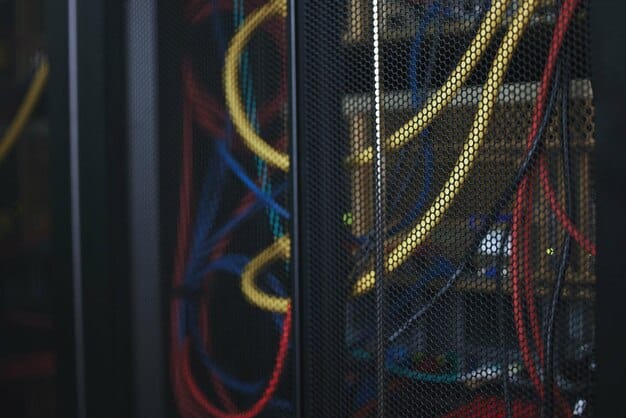Web3 News: Decentralized Storage & Lasting News Archives

Web3 news, with its decentralized storage solutions, promises to revolutionize the accessibility and longevity of news archives by eliminating single points of failure, enhancing data security, and ensuring permanent access to information, fostering transparency and combating censorship in the digital age.
The emergence of Web3 news and decentralized storage solutions is poised to transform how news archives are maintained and accessed. By leveraging blockchain technology and distributed networks, we can ensure the accessibility and longevity of news for generations to come.
Understanding Decentralized Storage in the Context of Web3 News
Decentralized storage is a core component of Web3, offering an alternative to traditional centralized data storage systems. This technology is particularly relevant for news organizations striving to preserve the integrity and accessibility of their archives.
Unlike centralized storage, where data is housed in a single location controlled by a single entity, decentralized storage distributes data across a network of computers. This approach offers several key advantages, especially for safeguarding news archives.
Key features of decentralized storage:
- Data Redundancy: Data is replicated across multiple nodes, reducing the risk of data loss due to hardware failure or cyberattacks.
- Immutability: Using blockchain technology ensures that once data is stored, it cannot be altered or deleted, preserving the integrity of news archives.
- Censorship Resistance: With no single point of control, it becomes extremely difficult for any entity to censor or remove information.
- Enhanced Security: Distributed storage minimizes the risk of data breaches by avoiding centralized honeypots that attract malicious actors.
Decentralized storage can significantly enhance the reliability and security of news archives. By eliminating single points of failure and making data tamper-proof, this technology ensures news remains accessible and credible.

The Impact on Accessibility of News Archives
One of the most significant benefits of decentralized storage solutions is the improved accessibility of news archives. Traditional archives are often siloed, making it difficult for the public, researchers, and journalists to access historical information.
Decentralized systems provide a more open and inclusive approach, ensuring that news archives are available to anyone with an internet connection. This level of accessibility fosters transparency and empowers individuals to verify information and hold institutions accountable.
Benefits of improved accessibility:
- Open Access: Decentralized platforms allow anyone to access news archives without needing permission from a central authority.
- Enhanced Research: Researchers can easily access and analyze historical data, leading to deeper insights and a more comprehensive understanding of events.
- Fact-Checking: Journalists and the public can verify information and sources, helping to combat misinformation and promote credible reporting.
- Global Reach: Decentralized storage enables news organizations to reach a broader audience, bypassing geographical and political barriers.
Making news archives more accessible promotes a better-informed society. Decentralized storage democratizes access to information, allowing for more thorough fact-checking, research, and understanding of historical events.
Ensuring Longevity of News Content Through Decentralization
Longevity is a critical concern for news organizations. Traditional storage methods are prone to degradation, obsolescence, and data loss. Decentralized storage offers a more robust and sustainable solution for preserving news content over the long term.
By distributing data across a network and ensuring immutability, decentralized storage protects news archives from the ravages of time and technological change. It offers a secure and reliable method for preserving vital historical records.
Why longevity matters:
- Preserving History: News archives are essential for understanding the past and informing future generations.
- Combating Revisionism: Ensuring the integrity of news archives helps prevent the manipulation or distortion of historical events.
- Institutional Memory: News organizations can maintain a comprehensive record of their reporting, allowing them to learn from past mistakes and improve their practices.
- Accountability: Accessible and immutable news archives hold individuals and institutions accountable for their actions and statements.
Decentralization contributes to the longevity of news by creating multiple backups and safeguards. This ensures that even if one part of the network fails, the information remains accessible and intact, preserving news content for future generations.

Addressing Concerns and Challenges in Implementing Decentralized Storage
While decentralized storage offers numerous benefits, there are challenges and concerns that need to be addressed. These include scalability, cost, regulatory compliance, and user adoption.
Scalability is a significant issue, as decentralized networks can struggle to handle large volumes of data efficiently. Cost can also be a barrier, as decentralized storage solutions may require significant upfront investment and ongoing maintenance expenses.
Challenges to implementation:
Scalability:
Achieving scalability in decentralized storage networks requires innovative solutions such as sharding and layer-2 protocols, which can increase transaction throughput and storage capacity. News organizations need to carefully evaluate the scalability of different decentralized platforms to ensure they can handle their growing archives.
Cost:
While the initial investment in decentralized storage can be significant, long-term cost savings may be realized through reduced infrastructure and maintenance expenses. News organizations should conduct a thorough cost-benefit analysis to determine the financial viability of decentralized storage solutions.
Regulatory Compliance:
Operating within legal and regulatory frameworks poses challenges, especially regarding data privacy and compliance with GDPR and other regulations. News organizations must ensure their decentralized storage solutions comply with all applicable laws and regulations.
By addressing these challenges proactively, news organizations can harness the full potential of decentralized storage while minimizing the risks. Careful planning, strategic partnerships, and ongoing monitoring are essential for successful implementation.
Real-World Applications and Case Studies of Web3 News Storage
Several organizations are already exploring and implementing decentralized storage solutions for news archives. These real-world applications and case studies provide valuable insights into the potential of this technology.
One notable example is the use of blockchain-based platforms to create immutable and transparent records of news articles. These platforms ensure that articles cannot be altered or deleted without leaving a permanent trace, enhancing the credibility of the news.
Examples of real-world applications:
- Fact-checking initiatives: Decentralized platforms are being used to verify the accuracy of news stories and combat misinformation.
- Censorship-resistant news outlets: News organizations in countries with strict censorship laws are using decentralized storage to bypass government controls.
- Archiving historical events: Decentralized storage is being used to preserve records of significant historical events, ensuring they remain accessible to future generations.
- Empowering citizen journalists: Decentralized platforms allow citizen journalists to publish and preserve their work without fear of censorship or reprisal.
These examples demonstrate the transformative potential of decentralized storage in the news industry. By embracing this technology, news organizations can enhance the accessibility, longevity, and credibility of their archives.
The Future of News Archiving: A Decentralized Vision
Decentralized storage solutions represent a departure from traditional methods. As technology continues to evolve, the integration of these solutions will grow, fostering a more transparent, secure, and accessible future for news archives.
The vision for the future of news archiving involves a global network of decentralized nodes storing vast amounts of news content. This network will be accessible to anyone with an internet connection, facilitating research, fact-checking, and a deeper understanding of world events.
Key predictions for the future:
- Wider adoption: More news organizations will adopt decentralized storage solutions as the technology becomes more mature and cost-effective.
- Enhanced security: Decentralized storage will provide stronger protection against cyberattacks and data breaches.
- Greater transparency: Decentralized platforms will promote greater transparency in news reporting and archiving.
- Improved accessibility: News archives will become more accessible to researchers, journalists, and the public.
The future of news archiving is decentralized, empowering individuals with access to high-quality, reliable information. By embracing this technology, we can ensure that news remains accessible, credible, and enduring for generations to come.
| Key Point | Brief Description |
|---|---|
| 🔑 Decentralized Storage | Distributes data across a network, enhancing security and redundancy. |
| 🌐 Improved Accessibility | Allows open access to news archives, promoting transparency. |
| ⏳ Enhanced Longevity | Ensures news content is preserved for future generations. |
| 🛡️ Censorship Resistance | Protects news archives from censorship and manipulation. |
Frequently Asked Questions
▼
Decentralized storage distributes data across a network of computers, rather than storing it in a single, centralized location. This enhances security, redundancy, and censorship resistance.
▼
Decentralized systems allow anyone to access news archives without needing permission from a central authority, promoting open access and transparency.
▼
Longevity ensures that news content is preserved for future generations, helping to combat revisionism and maintain institutional memory.
▼
Challenges include scalability, cost, regulatory compliance, and user adoption. News organizations need to address these issues proactively for successful implementation.
▼
Examples include fact-checking initiatives, censorship-resistant news outlets, archiving historical events, and empowering citizen journalists to publish their work.
Conclusion
Decentralized storage solutions hold immense promise for the future of news archiving. By embracing this technology, news organizations can enhance the accessibility, longevity, and credibility of their archives, ensuring that reliable and transparent information remains available for generations to come.





